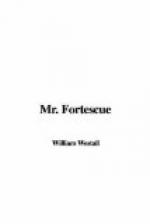It was all he asked.
“When I find that volcano, Don Alberto,” I said, “not a mere handful of diamonds, but a bucketful.”
This was almost our last talk, for the very same day news was brought that Lord Wellington, having been forced to raise the siege of Burgos, was retreating toward the Portuguese frontier, and that Salamanca would almost inevitably be recaptured by the French. Orders were given for the removal of the wounded to the Coa, where the army was to take up its winter quarters, and Zamorra and I had to part. We parted with mutual expressions of good-will, and in the hope, destined never to be realized, that we might soon meet again. I had seen Don Alberto for the last time.
A few weeks later I was sufficiently recovered from my hurts to use my bridle-arm, and before the opening of the next campaign I was fit for the field and eager for the fray. It was the campaign of Vittoria, one of the most brilliant episodes in the military history of England. Even now my heart beats faster and the blood tingles in my veins when I think of that time, so full of excitement, adventure, and glory—the forcing of the Pyrenees, the invasion of France, the battles of Bayonne, Orthes, and Toulouse, and the march to Paris.
But as I am not relating a history of the war, I shall mention only one incident in which I was concerned at this period—an incident that brought me in contact with a man who was destined to exercise a fateful influence on my career.
It occurred after the battle of Vittoria. The French were making for the Pyrenees, laden with the loot of a kingdom and encumbered with a motley crowd of non-combatants—the wives and families of French officers, fair senoritas flying with their lovers, and traitorous Spaniards, who, by taking sides with the invaders, had exposed themselves to the vengeance of the patriots. So overwhelming was the defeat of the French, that they were forced to abandon nearly the whole of their plunder and the greater part of their baggage, and leave the fugitives and camp-followers to their fate.
Never was witnessed so strange a sight as the valley of Vittoria presented at the close of that eventful day. The broken remains of the French army hurrying toward the Pamplona road, eighty pieces of artillery, served with frantic haste, covering their retreat; thousands of wagons and carriages jammed together and unable to move; the red-coated infantry of England, marching steadily across the plain; the boom of the cannon, the rattle of musketry, the scream of women as the bullets whistled through the air and shells burst over their heads—all this made up a scene, dramatic and picturesque, it is true, yet full of dire confusion and Dantesque horror; for death had reaped a rich harvest, and thousands of wounded lay writhing on the blood-stained field.
Owing to the bursting of packages, the overturning of wagons, and the havoc wrought by shot and shell, valuable effects, coin, gems, gold and silver candlesticks and vessels, priceless paintings, the spoil of Spanish churches and convents, were strewed over the ground. There was no need to plunder; our men picked up money as they matched, and it was computed that a sum equal to a million sterling found its way into their knapsacks and pockets.




